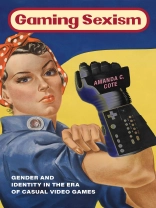Interviews with female gamers about structural sexism across the gaming landscape
When the Nintendo Wii was released in 2006, it ushered forward a new era of casual gaming in which video games appealed to not just the stereotypical hardcore male gamer, but also to a much broader, more diverse audience. However, the Gamer Gate controversy six years later, and other similar public incidents since, laid bare the internalized misogyny and gender stereotypes in the gaming community. Today, even as women make up nearly half of all gamers, sexist assumptions about the what and how of women’s gaming are more actively enforced.
In Gaming Sexism, Amanda C. Cote explores the video game industry and its players to explain this contradiction, how it affects female gamers, and what it means in terms of power and gender equality. Across in-depth interviews with women-identified gamers, Cote delves into the conflict between diversification and resistance to understand their impact on gaming, both casual and “core” alike. From video game magazines to male reactions to female opponents, she explores the shifting expectations about who gamers are, perceived changes in gaming spaces, and the experiences of female gamers amidst this gendered turmoil. While Cote reveals extensive, persistent problems in gaming spaces, she also emphasizes the power of this motivated, marginalized audience, and draws on their experiences to explore how structural inequalities in gaming spaces can be overcome. Gaming Sexism is a well-timed investigation of equality, power, and control over the future of technology.
Om författaren
Amanda C. Cote is Assistant Professor of Media Studies/Games Studies in the School of Journalism and Communication at the University of Oregon. Her work focuses on video game culture and industry, with an emphasis on questions of gender, identity, and power.












